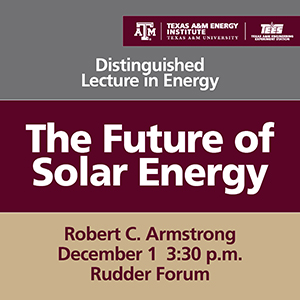
The Future of Solar Energy
On December 1, 2016 from 3:30 – 5:00 p.m. in the Rudder Forum, the Texas A&M Energy Institute will host a Distinguished Lecture in Energy by Dr. Robert C. Armstrong, Director of the MIT Energy Initiative and Chevron Professor of Chemical Engineering at the Massachusetts Institute of Technology.
Abstract
Solar energy holds the best potential for meeting humanity’s future long-term energy needs while cutting greenhouse gas emissions – but to realize this potential will require increased emphasis on developing lower-cost technologies and more effective deployment policy. This talk presents results of a comprehensive study on The Future of Solar Energy by the MIT Energy Initiative (MITEI), which is part of a series of multidisciplinary reports that examine the role various energy sources could play in meeting future energy demand under carbon dioxide emissions constraints.
The Future of Solar Energy study reflects on the technical, commercial and policy dimensions of solar energy today and makes recommendations to policymakers, illustrated in the U.S. context, regarding more effective support for research and development, technology demonstration, and solar deployment.
Among its major themes is the need to prepare our electricity systems, both technically and from a regulatory standpoint, for very large-scale deployment of solar generation – which tends to vary unpredictably throughout the day. To this end, the study emphasizes the need for research and development support to advance low-cost, large-scale electricity storage technologies.
The analysis finds that in the U.S., today’s federal and state subsidy programs designed to encourage investment in solar systems should be reconsidered, to increase their cost-effectiveness, with greater emphasis on rewarding production of solar energy.
The study also recommends that state renewable portfolio standards, which are designed to increase generation of electricity from renewable resources, be brought under a unified national program that would reduce the cost of meeting set mandates by allowing unrestricted interstate trading of credits.
The study concludes by pointing to the urgent need for an ambitious and innovative approach to technology development, with federal research and development investment focused on new technologies and systems with the potential to deliver transformative system cost reductions. For more information or a downloadable copy of The Future of Solar Energy study, visit energy.mit.edu/research/future-solar-energy.
Biography
Professor Robert C. Armstrong is the director of the MIT Energy Initiative and Chevron Professor of Chemical Engineering at the Massachusetts Institute of Technology (MIT).
He was previously department head of Chemical Engineering at MIT and served as co-chair of MIT’s Energy Research Council and as the Founding Deputy Director of the MIT Energy Initiative.
He completed his undergraduate studies at the Georgia Institute of Technology with highest honors in 1970, with a Bachelor of Chemical Engineering Degree. He then received a Doctor of Philosophy in 1973 from the University of Wisconsin, Madison, in Chemical Engineering.
Professor Armstrong has received a number of awards, including the AIChE Warren K. Lewis Award, AIChE Professional Progress Award, the Bingham Medal from the Society of Rheology, the University of Wisconsin-Madison Distinguished Service Citation, and election to the Georgia Tech Academy of Distinguished Engineering Alumni. His two-volume book, “Dynamics of Polymer Liquids,” has been named a Citation Classic. He is a member of the National Academy of Engineering.
Professor Armstrong has published and lectured extensively in the areas of energy, polymer fluid mechanics, and the rheology of complex materials.


